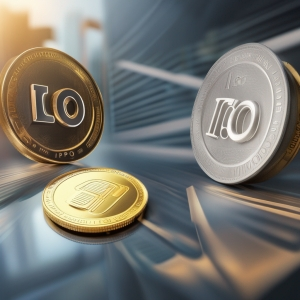Table of Contents:
Introduction: Understanding ICO and IPO
Before delving into the difference between ICO and IPO, it's crucial to understand what these terms mean. ICO stands for Initial Coin Offering, a fundraising mechanism used by new cryptocurrency projects. In an ICO, a percentage of the new cryptocurrency is sold to early investors in exchange for legal tender or other established cryptocurrencies like Bitcoin or Ethereum.
On the other hand, IPO refers to Initial Public Offering, a process through which a private company goes public by selling its stocks to the general public for the first time. One of the primary purposes of an IPO is to raise capital for the company's expansion or pay off existing debt.
The Best Mining Providers at a Glance
» Infinity HashFrom our perspective, currently the best mining provider on the market. With the community concept, you participate in a mining pool completely managed by professionals. A portion of the earnings are used for expansion and maintenance. We've never seen this solved as cleanly anywhere else.
» Hashing24A well-known and established cloud hosting company. With a good entry point and in a good market phase, a good ROI can also be generated with some patience. Unfortunately, we see the durations as a major drawback.
Investing in either ICOs or IPOs comes with its share of advantages and potential risks, but understanding these intricacies is a vital step towards making informed investment decisions. Keep reading to get insights into ICO vs IPO: which is the better investment?
What is an ICO?
In its simplest form, an ICO (Initial Coin Offering) is a innovative financial and technological mechanism used by blockchain-based startups. It provides these companies a straightforward and efficient way to raise capital, circumventing the traditional and often cumbersome process of engaging venture capitalists or banks. To raise funds, these companies issue a new type of digital asset known as a 'token'.
Tokens are representative of certain utilities or assets and can range from being a stake in the company (similar to shares in an IPO) to a right to access a service or product that the company provides. Investors participate in the ICO by sending funds (often in the form of Bitcoin or Ethereum) to the project, and in return they receive tokens.
However, it's important to understand that these tokens are not shares. While tokens might confer some future rights, they don't give holders any voting rights or a claim on assets, like shares would in an IPO. More importantly, investors should be aware that the ICO space is less regulated than traditional finance. This lack of regulatory oversight can lead to increased risk, including the potential for scams and fraud.
Comparison of ICO and IPO Investments
| Investment Type | Pros | Cons |
|---|---|---|
| ICO (Initial Coin Offering) |
|
|
| IPO (Initial Public Offering) |
|
|
How does an ICO work?

An ICO starts with a new blockchain project producing a whitepaper. This document discloses crucial information such as the details of the project, its purpose, the amount of capital required, the number of tokens the founders will keep, the type of currency accepted, and the length of the ICO campaign.
When the ICO campaign commences, supporters of the project can buy some of the project's tokens with digital currency. These tokens primarily come in the form of the project's own token or other popular cryptocurrencies such as Bitcoin or Ethereum. This is executed with the expectations that the project becomes successful after its launch.
If the money raised does not meet the minimum funds dictated by the firm, the funds are returned to the backers, and the ICO is considered a failure. If the project turns out a success, these ICO tokens could potentially earn a significant profit for the initial investors.
However, it's crucial to keep in mind that while an ICO may result in high returns if the project succeeds, there is also a high risk especially for those investors who don't undertake a thorough analysis of the project. Thus, it is always recommended to perform due diligence before investing in any ICO.
Pros and Cons of ICO
The rise of ICOs as a fundraising mechanism has been significant because of a variety of benefits for both the company and the investor. The most apparent advantage is that ICOs offer a quicker and easier way for startups to raise money without the need for regulatory compliance and intermediaries.
For investors, ICOs provide early access to potentially groundbreaking technology. They offer high upside potential, with many ICO tokens experiencing a substantial increase in value post-launch. Another advantage for the investor is the liquidity. Unlike traditional venture capital investments, tokens can often be sold relatively easily on various exchanges.
However, the ICO space also comes with its downsides. The biggest drawback to an ICO is the lack of regulatory oversight, which increases the risk of scams and fraud. Many ICOs have proven to be nothing more than sophisticated theft, with founders disappearing after collecting funds.
Another notable con is the high volatility in the price of tokens after the ICO. This can result in potential losses if the token's price goes down after the ICO. Additionally, due to the still-developing nature of the industry, many ICOs fail to deliver on their promises, leading to a significant loss for investors.
What is an IPO?

An Initial Public Offering, or IPO, is a process where a company transition from private ownership to public trading. It involves the sale of a company's shares to institutional and retail (individual) investors for the first time, thereby raising capital from the public. The funds generated through an IPO are typically used to fuel expansion, pay down debt, or for other corporate purposes. It also provides the company with an opportunity to improve its public image and create a market for its shares.
Before a company can go public, it must meet specific financial and regulatory criteria, including a thorough audit of its finances. The company works with investment banks (also known as underwriters), which structure the IPO, help determine the share price and volume of shares to be issued, and secure initial buyers.
Once shares are listed on a stock exchange, any investor can purchase them. Shareholders have a financial stake in the company and often receive dividends from profits and can benefit from any increase in the share price. Unlike ICOs, investment in IPOs provides the right to vote on company decisions and a share of any profits distributed.
While IPOs can provide companies with the needed resources for growth and give investors the chance to participate in a company's success, they carry their own set of risks. These include the inherent unpredictability of the stock market and company-specific issues such as mismanagement or a downturn in the sector in which the company operates.
How Does an IPO Work?
An IPO process begins with a private company deciding to go public. Initially, the company selects an investment bank to act as an underwriter. The role of the underwriter is to evaluate the company’s value, help set the initial share price, handle the sale of shares, and ensure regulatory compliance.
Once the underwriter is onboard, the next step involves the company releasing a prospectus. The purpose of this document is to provide potential investors with detailed financial information about the company, its business model, financial performance, and future plans. The Securities and Exchange Commission (SEC) reviews this prospectus to ensure it meets all the necessary standards.
Following the prospectus release, a 'roadshow' begins. During this phase, the company's management and the underwriter travel around to meet potential investors, give presentations, and answer questions. The purpose is to drum up interest and determine the initial share price before shares are offered to the public.
After the roadshow, the company's shares are finally made available for purchase on a stock exchange. It’s important to note that IPOs allow investors to buy shares and thereby own a portion of the company, unlike ICOs, where tokens do not confer ownership. This process is highly regulated, providing some measure of investor protection.
However, investing in an IPO also carries risk, especially if the company doesn't perform as expected or faces any kind of market downturn. It's essential for investors to research thoroughly about the company and its financial standing before investing.
Pros and Cons of IPO

An IPO, or Initial Public Offering, brings several benefits to both the company going public and the investors. The most significant advantage for the company is the ability to raise substantial funds for growth and expansion. This added capital can be used for investing in new projects, reducing debts, or financing acquisitions. Moreover, it helps a company increase its visibility and credibility in the market, attracting more customers and partnerships.
For investors, partaking in an IPO gives them an opportunity to buy shares of a company they believe will grow in the future. Buying shares during an IPO is usually less expensive, and it can lead to significant profits if the company’s stock price appreciates over time. Furthermore, IPOs are regulated by government authorities like SEC in the U.S., bringing in higher transparency and reducing the risk of scams.
However, IPOs also have their downsides. For the company, conducting an IPO is not an easy process. It requires tremendous preparation, including revamping financial systems, rigorous auditing, satisfying regulatory requirements, and more. It's expensive, consumes considerable time and resources, and puts considerable pressure on the company’s management.
For investors, while IPOs are regulated, they are not risk-free. The company’s stock price may not always go up. Sometimes, hype and speculation can inflate the IPO price, leading to losses when the price corrects itself. Furthermore, small investors often get a minor allocation of shares, which restricts their ability to earn substantial profits from the IPO. Investors also need to keep an eye on 'lock-up' periods, which prevent them from selling the shares for a certain timeframe.
ICO vs IPO: Comparing the two
When comparing ICO and IPO, a few key differences separate these two methods of fundraising. The first distinction is the level of regulation. IPOs are heavily regulated by financial authorities and involve a lengthy and costly process for the company going public. Companies need to make comprehensive financial disclosures, and a third-party review is often mandatory. On the contrary, ICOs are significantly less regulated, which makes the process susceptible to scams.
The second key difference lies in the liquidity of the investments. ICO tokens can often be easily traded on various cryptocurrency exchanges shortly after the offering, providing high liquidity. However, shares in an IPO are subject to a lock-up period restricting the selling of the shares for a specific period, reducing the liquidity.
The third noticeable difference is in the entry barrier. Generally, IPOs are targeted at institutional investors or high-net-worth individual investors, with a minimum investment amount often set quite high. On the flip side, ICOs can be accessed by anyone with an internet connection and digital currency, providing a much lower entry barrier.
Lastly, the return on investment can most likely differ. ICOs could offer a high return on investment if the project is successful. Although, the risk of failure is equally high. When comparing, shares bought through an IPO typically offer a more stable and predictable rate of return.
In conclusion, while IPOs and ICOs share the common goal of raising funds for a company they drastically differ in their approach and have their unique sets of advantages and potential risks. Your choice to invest in an ICO or an IPO should be based on your risk tolerance, investment preferences, understanding of the technology and belief in the future of cryptocurrencies and blockchain technology.
Which is a Better Investment: ICO or IPO?
When debating whether an ICO or an IPO is a better investment, it ultimately boils down to individual risk tolerance, understanding of the sector, and investment goals. Both offerings have their own unique potential benefits and drawbacks.
For investors seeking higher returns and ready to take significant risk, ICOs can be an exciting opportunity. They provide an opportunity to get in on the ground floor of potentially revolutionary technological projects. With the right choice and due diligence, investing in ICOs can reap remarkable profits.
However, the lack of regulatory oversight and notorious volatility associated with these ventures means that they carry a higher risk. That being said, savvy and well-informed investors can still find promising ICOs worth investing in, provided they thoroughly understand the technology and business model of the project.
On the contrary, IPOs provide a comparatively safer investment avenue. They are handled by established companies with proven business models, audited financials, and are overseen by regulatory bodies. This regulatory scrutiny makes it difficult for fraud to occur, unlike in some ICO cases. But the return on investment in IPOs tends to be more predictably moderate in nature.
This is not to say that IPOs are risk-free - the company's performance, market competition, and general economic conditions can still lead to losses. But overall, IPOs can provide a good blend of security and return for investors, especially for those seeking a stable addition to their portfolio.
In conclusion, neither ICOs nor IPOs are inherently better; it depends very much on the individual investor's profile. A diverse portfolio could include both IPOs with their relative security and reliability and ICOs for their high-risk, high-reward potential.
Conclusion
As an investor, it is crucial to understand the different dynamics at play when considering ICO vs IPO as investment avenues. ICOs can be a high-risk, high-reward proposition, offering potentially oversized returns while significantly challenging traditional finance norms. On the other hand, IPOs provide a more regulated and traditional method of investing in a company's future, often with a more predictable and lower-risk path to returns.
It also calls for investors to be profoundly aware and diligent, conducting proper research before delving into any investment, be it ICO or IPO. With the financial world becoming increasingly disruptive and exciting, choosing the right investment method will depend largely on individual investment goals, risk tolerance levels, and understanding of the underlying asset, whether it is a digital one or not.
While we have provided some insight into the question "ICO vs IPO: Which is a better investment?", the answer will invariably be different for each prospective investor. Keep in mind that this article is not financial advice, and due diligence should always be carried out before making any investment decision.
As the world continues to evolve, and the boundary between digital and traditional assets continues to blur, the opportunity to invest via ICOs or IPOs presents an exciting way to participate in future growth and innovation. But always remember, regardless of the prospective returns, every investment comes with its own set of risks and the potential for loss.
With the right approach and a balanced understanding of investing, however, both can form part of a healthy investment portfolio. Ultimately, the decision between ICO and IPO as the better investment is one that each investor has to make for themselves, based on their personal circumstances and investment strategy.
Understanding ICO and IPO: A Comparative Study
What is an IPO?
An IPO refers to the process of offering the shares of a private corporation to the public in a new stock issuance. It allows a company to raise capital from public investors.
What is an ICO?
ICO stands for Initial Coin Offering. It is akin to an IPO, but in the blockchain world. ICOs act as fundraisers; a company looking to create a new coin, app, or service launches an ICO for raising capital.
What are the risks associated with an IPO?
IPOs are subject to more governmental regulation. Investors may also face the risk of uncertainty over profits, and market risks influenced by economic factors.
What are the risks associated with an ICO?
ICOs are risky due to less regulatory oversight, giving rise to potential fraud or scam. The high volatility of the token price is another risk for investors.
Which is a better investment, IPO or ICO?
Both IPOs and ICOs have their own advantages and risks. While IPOs are traditionally safer, ICOs can offer significant returns with right investments. An informed decision based on research and risk tolerance is required before investing.










